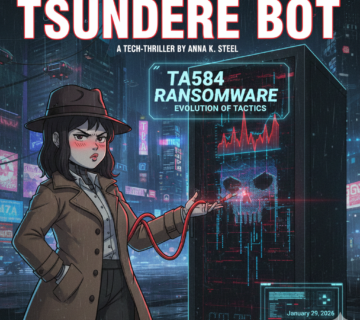SaaS Giant Workiva Discloses Major Data Breach Following Salesforce Attack
🎙️ Dive Deeper with Our Podcast!
Workiva Breach: A Salesforce Attack Ripple Effect
👉 Listen to the Episode: https://technijian.com/podcast/workiva-breach-a-salesforce-attack-ripple-effect/
The cybersecurity landscape has been shaken once again as Workiva, a prominent cloud-based Software as a Service provider, recently announced a significant data breach that compromised customer information. The breach forms part of a larger series of attacks aimed at Salesforce environments within numerous companies, underscoring the increasing exposure of tightly connected enterprise systems to cyber threats.
Understanding the Workiva Data Breach
Workiva, known for its comprehensive cloud software solutions that help organizations collect, connect, and share data for financial reporting, compliance, and auditing purposes, found itself at the center of a cybersecurity incident after SaaS giant Workiva discloses data breach that affected its customer base. The company, which serves an impressive roster of 6,305 customers and generated $739 million in revenue during 2024, discovered that unauthorized actors had gained access to sensitive customer information through a compromised third-party customer relationship management system.
The breach specifically targeted business contact information, resulting in the theft of customer names, email addresses, phone numbers, and support ticket content. While this represents a limited dataset compared to what could have been accessed, the implications for affected customers remain significant, particularly given the potential for this information to be weaponized in targeted phishing campaigns.
The Scale and Impact of the Attack
What makes this breach particularly concerning is the caliber of Workiva’s client base. The company serves 85% of Fortune 500 companies, including household names such as Google, T-Mobile, Delta Air Lines, Wayfair, Hershey, Slack, Cognizant, Santander, Nokia, Kraft Heinz, Wendy’s, Paramount, Air France KLM, and Mercedes-Benz. The breadth of this customer portfolio means that the stolen information could potentially be used to target some of the world’s most influential organizations.
The attack vector utilized in this breach demonstrates the sophisticated nature of modern cyber threats. Rather than directly targeting Workiva’s primary systems, the attackers exploited a connected third-party application to gain unauthorized access to the company’s customer relationship management vendor. This approach highlights how interconnected business ecosystems can create unexpected vulnerabilities that cybercriminals are increasingly adept at exploiting.
Connection to the Broader Salesforce Attack Campaign
This incident represents just one piece of a much larger cybersecurity puzzle involving widespread attacks on Salesforce instances. The breach is directly linked to activities conducted by ShinyHunters, a notorious extortion group that has been systematically targeting Salesforce customers throughout the year using increasingly sophisticated techniques.
At first, ShinyHunters relied on voice-based phishing techniques to infiltrate the targeted systems. However, their methods have evolved to include the exploitation of stolen OAuth tokens, particularly those associated with Salesloft’s Drift AI chat integration with Salesforce. This evolution in attack methodology has proven highly effective, allowing the group to access customer Salesforce instances and extract sensitive information including passwords, AWS access keys, and Snowflake tokens directly from customer communications and support documentation.
The Ripple Effect Across the Industry
The scope of ShinyHunters’ campaign extends far beyond Workiva, encompassing a diverse range of high-profile organizations across multiple industries. Among the group’s earlier targets are major tech firms like Google and Cisco, insurers including Allianz Life and Farmers Insurance, enterprise platform provider Workday, airline carrier Qantas, as well as fashion powerhouses such as Adidas and LVMH-owned labels Dior, Louis Vuitton, and Tiffany & Co.
Perhaps most concerning is the group’s success in breaching multiple cybersecurity companies themselves, including Zscaler, Tenable, CyberArk, BeyondTrust, Proofpoint, JFrog, Rubrik, Cato Networks, and Palo Alto Networks. These breaches represent a particular irony, as these organizations specialize in protecting others from exactly the type of attacks they themselves fell victim to.
Workiva’s Response and Customer Protection Measures
In response to the breach, Workiva has taken several steps to protect its customers and prevent further unauthorized access. The company immediately notified affected customers through private email communications, providing transparency about the nature and scope of the incident. Workiva made it clear that its core platform, along with the data housed there, stayed fully protected and was never breached during the incident.
The company has also issued specific warnings to help customers protect themselves from potential follow-up attacks. Workiva explicitly stated that it will never contact customers via text or phone to request passwords or other sensitive security information, and that all legitimate communications from the company will come through established official support channels.
Industry-Wide Implications and Lessons Learned
This breach serves as a stark reminder of the interconnected nature of modern business technology ecosystems and the risks that come with third-party integrations. Organizations increasingly rely on multiple software-as-a-service providers and integration platforms to deliver comprehensive solutions to their customers. While these integrations provide significant operational benefits, they also create potential attack vectors that cybercriminals are actively seeking to exploit.
The sophistication of the ShinyHunters campaign, particularly their ability to pivot from voice phishing to OAuth token exploitation, demonstrates the evolving nature of cyber threats. Traditional security measures may prove insufficient against attackers who can adapt their techniques to exploit newly discovered vulnerabilities in interconnected systems.
Protecting Against Similar Attacks
Organizations can take several steps to protect themselves from similar attacks. First, implementing comprehensive third-party risk management programs that include regular security assessments of all connected applications and services is essential. This includes maintaining an inventory of all third-party integrations and understanding the data flows between different systems.
Second, organizations should implement robust authentication and authorization controls, particularly for applications that integrate with customer relationship management systems or other repositories of sensitive customer information. This includes regular rotation of OAuth tokens and other authentication credentials, as well as implementing principle of least privilege access controls.
Third, employee education and awareness programs focused on social engineering attacks, including voice phishing, remain critical. As ShinyHunters demonstrated with their initial attack vector, human factors continue to play a significant role in cybersecurity incidents.
Frequently Asked Questions
What specific information was stolen in the Workiva breach? The attackers gained access to business contact information including customer names, email addresses, phone numbers, and support ticket content. Workiva’s main platform and the data stored within it were not compromised.
How did the attackers gain access to Workiva’s systems? The breach occurred through unauthorized access to a connected third-party application that integrated with Workiva’s customer relationship management vendor, rather than a direct attack on Workiva’s primary systems.
Who is responsible for these attacks? The attacks have been attributed to ShinyHunters, an extortion group that has been systematically targeting Salesforce customers using various techniques including voice phishing and OAuth token exploitation.
What other companies have been affected by similar attacks? The campaign has impacted numerous high-profile organizations including Google, Cisco, Cloudflare, various cybersecurity companies like Zscaler and Palo Alto Networks, and luxury brands under LVMH such as Louis Vuitton and Tiffany & Co.
How can customers protect themselves from follow-up attacks? Customers should remain vigilant against phishing attempts, verify any suspicious communications through official channels, and be aware that Workiva will never request passwords or sensitive information via text or phone calls.
What steps has Workiva taken in response to the breach? Workiva promptly notified affected customers, confirmed that their main platform remained secure, and provided guidance on identifying legitimate communications from the company.
How Technijian Can Help Protect Your Organization
At Technijian, we understand the complex challenges organizations face in today’s evolving cybersecurity landscape. Our comprehensive security services are designed to help businesses protect themselves against sophisticated attacks like the one experienced by Workiva and numerous other organizations.
Our team of cybersecurity experts specializes in third-party risk assessment and management, helping organizations identify and mitigate vulnerabilities in their interconnected technology ecosystems. We provide thorough security evaluations of all third-party integrations, ensuring that your organization maintains visibility and control over potential attack vectors.
Technijian offers advanced threat detection and response services that can identify suspicious activities across your entire technology infrastructure, including integrated applications and customer relationship management systems. Our proactive monitoring capabilities help detect unauthorized access attempts before they can result in data exfiltration.
We also provide comprehensive employee training programs focused on social engineering awareness and incident response procedures. Given the role that human factors play in many cybersecurity incidents, ensuring that your team can identify and respond appropriately to potential threats is crucial for maintaining organizational security.
Additionally, our security consulting services include assistance with implementing robust authentication and authorization frameworks, OAuth token management, and access control policies that can help prevent unauthorized access to sensitive customer information.
For organizations looking to strengthen their cybersecurity posture in response to emerging threats like those demonstrated by the ShinyHunters campaign, Technijian provides the expertise and support necessary to build resilient defenses against sophisticated cyber attacks. Reach out to us today to discover how we can safeguard your business and customers against the ever-changing landscape of cyber threats.
About Technijian
Technijian is a premier managed IT services provider, committed to delivering innovative technology solutions that empower businesses across Southern California. Headquartered in Irvine, we offer robust IT support and comprehensive managed IT services tailored to meet the unique needs of organizations of all sizes. Our expertise spans key cities like Aliso Viejo, Anaheim, Brea, Buena Park, Costa Mesa, Cypress, Dana Point, Fountain Valley, Fullerton, Garden Grove, and many more. Our focus is on creating secure, scalable, and streamlined IT environments that drive operational success.
As a trusted IT partner, we prioritize aligning technology with business objectives through personalized IT consulting services. Our extensive expertise covers IT infrastructure management, IT outsourcing, and proactive cybersecurity solutions. From managed IT services in Anaheim to dynamic IT support in Laguna Beach, Mission Viejo, and San Clemente, we work tirelessly to ensure our clients can focus on business growth while we manage their technology needs efficiently.
At Technijian, we provide a suite of flexible IT solutions designed to enhance performance, protect sensitive data, and strengthen cybersecurity. Our services include cloud computing, network management, IT systems management, and disaster recovery planning. We extend our dedicated support across Orange, Rancho Santa Margarita, Santa Ana, and Westminster, ensuring businesses stay adaptable and future-ready in a rapidly evolving digital landscape.
Our proactive approach to IT management also includes help desk support, cybersecurity services, and customized IT consulting for a wide range of industries. We proudly serve businesses in Laguna Hills, Newport Beach, Tustin, Huntington Beach, and Yorba Linda. Our expertise in IT infrastructure services, cloud solutions, and system management makes us the go-to technology partner for businesses seeking reliability and growth.
Partnering with Technijian means gaining a strategic ally dedicated to optimizing your IT infrastructure. Experience the Technijian Advantage with our innovative IT support services, expert IT consulting, and reliable managed IT services in Irvine. We proudly serve clients across Irvine, Orange County, and the wider Southern California region, helping businesses stay secure, efficient, and competitive in today’s digital-first world.





